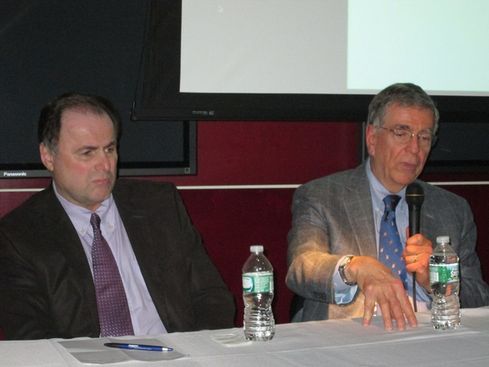From left to right: Neal Lispchutz, editor of ethics and standards for The Wall Street Journal and Dow Jones, and Clark Hoyt, editor at large for Bloomberg
NYFWA members enjoyed a unique panel examining ethics in financial journalism on Thursday, March 26th, an event that focused heavily on the impact digital journalism has had on ethics as a whole.
“You’re seeing the gradual delamination of news from what it was in the past,” Adam Penenberg, a professor at Arthur L. Carter Journalism Institute, New York University’s Arthur L. Carter Journalism Institute, told attendees at the event. “You’re dealing with a world where people are looking at information in bits and pieces… they don’t’ care about quality like they used to and, as a result, the brand names themselves are dissolving because people don’t want the whole newspaper anymore,” he said. As a result, he believes that “there isn’t the luxury for a lot of these publications to have the ethics they once had.”
According to panelists, the increasing electronic nature of the news people rely on has not only changed the overall economics of major publications, it has also changed the way most journalists report the beats they cover. “There’s a tendency not to bit the hand that feeds,” said Pulitzer Prize winner Steven Pearlstein, a columnist for The Washington Post. While he admitted that journalists’ tendencies to go a bit easier on their best sources is nothing new, Pearlstein believes the problem has been exacerbated by the fact that many journalists must now churn out multiple online stories a day, as well as blog posts and tweets on Twitter. As a result, journalists are more reliant on outsiders feeding them news tips and stories than ever, without the luxury of time to analyze what they are being told that previous generations of journalists once enjoyed.
As with most panels, the outlook of the individuals on the panel varied significantly. Unlike Penenberg’s belief that the increasingly electronic nature of journalism and the fact that younger generations now derive their news from unconventional sources such as Facebook and Twitter have harmed the economics of major publications, Clark Hoyt, another Pulitzer Prize winner who currently works as an editor at large for Bloomberg, believes ethics in financial journalism have remained fairly consistent, despite readily available online news sources.
“Technology and economics just make us see ethics in different lights,” Hoyt told attendees. In fact, when it comes to the age old problem of plagiarism, he believes that technology has actually been good thing –with so many correctives in the system making it easier to identify plagiarism than ever before. Conversely, Hoyt believes that a major problem of electronic journalism is the idea that getting news out first is sometimes more important than accuracy and that many journalists believe it is okay to simply add on corrections and fix inaccuracies down the road. In reality, however, he noted that it is virtually impossible to reign in inaccuracies in a world where new is so rapidly disseminated over social media.
Like Hoyt, Neal Lipschutz, editor of ethics and standards for The Wall Street Journal and Dow Jones, believes that the major brand names in financial journalism will stand the test of time. “I don’t believe that brands stop mattering to discerning readers,” Lipschutz told attendees, adding that he actually thinks that as more and more inexperienced and unknowledgeable individuals launch online publications that do a poor job of reporting and analyzing the news people will turn back to the more trusted names in journalism.
For Adam Feuerstein, a senior columnist for TheStreet.com, while the changing nature of journalism has meant a significantly larger workload, he argues that is it one experienced journalists can navigate without sacrificing ethics or accuracy in their reporting. Still, he admits that the online nature of news has changed the way reporting is done. “When you work online there is a pressure to be first and fast and to get stories up,” he said.
The NYFWA’s ethics panel was held in the Fox News sports suite –a location panelists took the opportunity to joke was an amusing and somewhat ironic choice for the evening’s discussion.
2
https://tstowl.com/wp-content/uploads/2015/03/ethicspanel_web.jpg
